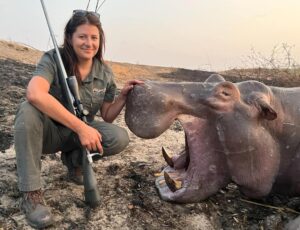

Both Hippo and Crocodile Trophies are Fully Exportable !! No Crocodile Size Limit
**** Observers welcome at US$350 p/day per person
Bull Hippo: Trophy Fee US$ 5000 plus 4% Government Taxes Total Hippo Cost: = US$ 5200
Nile Crocodile: Trophy Fee US$ 6000 plus 4% Government Taxes plus Cites Tag/Permit US$ 200 Total Crocodile Cost = US$ 6440
The Zambezi Valley is considered an excellent location for big game hunting safaris in Zimbabwe, particularly for dangerous game such as Elephant, Cape Buffalo, Lions and Leopard. The valley boasts wild terrain and high density of animal populations.
This concession is two million acres of unfenced habitat, along with more than a 150 miles of shoreline on Lake Kariba. This area of Omay is famous for aquatic safaris for Bull Hippo and Crocodile offering a safari of a lifetime.


Mapping out your trip to Nyakasanga, one of Zimbabwe’s top-tier hunting locations, is a fantastic way to embark on an extraordinary African safari.
For this Aquatic hunt, you will need to enter Zimbabwe at Harare International Airport (HRE), Zimbabwe’s primary international gateway. Carriers such as South African Airways, Ethiopian Airlines, and Qatar Airways provide seamless connections through major transit points such as Johannesburg, Addis Ababa, and Doha. To guarantee a smooth start to your hunting safari, it is suggested set aside a day in Harare (before and after the safari).
Depending on flight times, it may be more viable to spend a night in Johannesburg if you choose to reach Harare via Oliver Tambo Airport. Airlink is recommended for the return flight to Harare. Flights are affordable (+- US$ 400 return), on time and importantly serve “adult beverages”. Airlink also has facilities in place for rifles transfers. We would recommend African Sky Boutique Hotel situated in close proximity to OR Tambo Airport. Not only will management arrange transfers to and from African Sky/OR Tambo, but they will also assist with any firearm permits. For further information, see our “Affiliated Services” link below.
Depending on preferences, hunters can opt for a picturesque charter flight or a scenic road transfer .
Dalton and team have been hunting Zimbabwe, Cameroon and Mozambique for more than a decade. Their biggest passion is hunting in Zimbabwe, reason being that its one of the most unpredictable terrains, as well as having some of the most wild big game, bringing excitement the way every hunt should have.
They make dreams a reality through every resource they have available, dedicating themselves to the needs of every client, in order to make the hunt a success and mostly enjoyable.
Perched on the tranquil banks of the Ume River in the North Omay region, Ume Camp sits beside the breathtaking Matusadona National Park. The camp features four beautifully crafted, permanent suites with en-suite bathrooms, comfortably hosting up to eight guests. Guests can indulge in delicious meals at the shared dining area, enjoy a chilled drink at the bar while admiring the mesmerizing river scenery, or unwind by the refreshing swimming pool. Ume Camp offers dependable Wi-Fi, making it a perfect escape for families. Adventurous boat rides and exciting fishing trips can be arranged, and wildlife sightings are common right from the camp’s premises. As darkness falls, the distant calls of Hippos, Lions, Hyenas, and Elephants create a truly magical ambiance.
For those in search of a more secluded experience, Chifudzi Camp in the South Omay region provides a serene sanctuary. Boasting three cozy, permanent rooms with private bathrooms, the camp accommodates up to six guests. Visitors can savor mouthwatering meals and refreshing drinks while gazing over a verdant valley and a nearby water pan, often visited by plains game, Buffalo, and Elephant. The soothing environment and closeness to nature make Chifudzi Camp an exceptional choice for travelers looking to unwind and embrace Zimbabwe’s wilderness.
Crocodiles and Hippos, both semi-aquatic, each present a unique challenge in Zimbabwe’s Nyakasanga region. These creatures, living both in water and on land, require hunters to be highly skilled and prepared for danger.
Crocodiles are masters of stealth, blending into the murky waters of the Zambezi River with ease. Their primary strength lies in their patience. Lying motionless for hours, they can be difficult to spot along the riverbanks, their powerful eyes watching with acute focus. The thick, armored hide adds another challenge; only a well-placed shot to the brain or spinal column will guarantee a clean kill. Even a slightly off-target shot can send the Crocodile back into the depths, making recovery nearly impossible.
In stark contrast, Hippos may seem docile, but their aggression and territorial instincts make them one of the most dangerous animals in Africa. These massive creatures spend much of their time submerged, revealing only their eyes, ears, and nostrils, making them incredibly difficult to locate. Hunting a Hippo in Nyakasanga requires careful planning and flawless execution. Their thick skin and the unpredictability of their behavior make shot placement critical. Hippos travel in groups, so hunters must also account for surrounding individuals that could charge without warning. A precise shot is essential to ensure a swift, humane kill.
Both Crocodile and Hippo hunts require an extraordinary set of skills. Patience is paramount, as both species demand hours of tracking and observation. Precision shooting is essential, particularly in ensuring an ethical harvest. Understanding their behavior, staying aware of the environment, and knowing when to act or wait are critical for success.
Hunting safaris in Zimbabwe are conducted all year round, but the cooler and drier months from early April to late October are preferred.
In the warmer months, insect activity increases, such as pepper ticks which can make the consequences of walking through the brush even more of a challenge. Mosquitoes and other small pests are also far more active in the warmer and wetter conditions. In high temperatures, the risk of dehydration also increases and the importance of maintaining hydration is critical.
But, with that been said, Zimbabwe is great to hunt anytime!!
There is no limit to the number of firearms a hunter may import in Zimbabwe for game hunting purposes.
If any further information is required re this “Aquatic Hunt” in Zimbabwe, contact our team at Game Hunting Safaris, or message Dalton directly.
Please note that terms, conditions and price are subject to change without notice and rates at the time of the hunt will apply
Needing assistance with firearm permits and international travel services, or good taxidermists? View our affiliated companies
View Affiliated Services